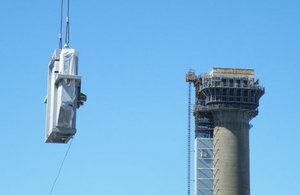First hole is cut in world's oldest nuclear store
Safely accessing the Pile Fuel Cladding Silo takes Sellafield Ltd a step closer to reducing the UK’s nuclear hazard.

Once each hole is cut in the silo, the section of concrete is cut away in a single piece (known as a monolith)
The world’s oldest nuclear waste store has been cut open for the first time.
Experts at the Sellafield nuclear site have cut the hole in the Pile Fuel Cladding Silo, a locked vault which was never designed to be opened.
This is the first of six holes that will allow radioactive waste to be removed from one of the site’s most hazardous buildings.
The silo was built in the 1950s when the site’s purpose was to make material for nuclear weapons.
Safely decommissioning the building is one of the highest priorities for Sellafield Ltd and the Nuclear Decommissioning Authority, and will take them a step closer to reducing the UK’s nuclear hazard.
The most complicated ‘hole in a wall’ ever made
Steven Carroll, Head of the Pile Fuel Cladding Silo, said:
I am incredibly proud of the work that our Sellafield Ltd and supply chain teams have achieved together, in preparing the silo for successful waste retrievals.
The level of challenge involved with this facility is unparalleled, considering the age of the building, the lack of historical information about the waste itself, the atmosphere inside the silo and its position on one of the most congested sites, anywhere in the world.
Despite this, the teams have carried out some world class engineering in difficult environments to get us closer to getting the waste out and into safer storage earlier than planned.
The work is being carried out by Sellafield Ltd, along with Bechtel Cavendish Nuclear Solutions and Babcock Marine Technology.
Preparations have been under way for a number of years, which involved practising the cutting operation at a full-scale replica test rig in Rosyth, Scotland.
The six holes are cut at the top of each of the facility’s six compartments, allowing access to the waste within the silo’s walls for the first time in 65 years.
Each section is cut away in a single piece and withdrawn into a containment bag. A containment door is then lowered over the aperture and closed.
The giant steel doors will provide a safe barrier between the waste inside the silo and the outside world. Work to remove the material will start in 2019.
To remove the waste, a crane will extend through the cut holes, a grabber will then drop down to scoop the waste up, lifting it out of the container and back through the hole.
It will then be dropped into a specially-designed metal box, for safe and secure storage in a modern facility.